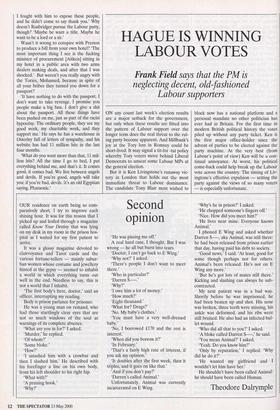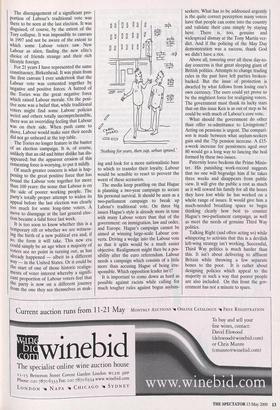HAGUE IS WINNING LABOUR VOTES
Frank Field says that the PM is
neglecting decent, old-fashioned Labour supporters
ON any count last week's election results are a major setback for the government, but only when these results are fitted into the pattern of Labour support over the longer term does the real threat to the rul- ing party become apparent. And Millbank's joy at the Tory loss in Romsey could be short-lived. It may signal a tit-for -tat policy whereby Tory voters move behind Liberal Democrats to unseat some Labour MPs at the general election.
But it is Ken Livingstone's runaway vic- tory in London that holds out the most immediate threat to Labour dominance. The candidate Tony Blair most wished to block now has a national platform and a personal mandate no other politician has ever had in Britain. For the first time in modern British political history the votes piled up without any party ticket. Ken is the first major office-holder since the advent of parties to be elected against the party machine. At the very best (from Labour's point of view) Ken will be a con- tinual annoyance. At worst, his political come-back could help break up the Labour vote across the country. The timing of Liv- ingtone's effective expulsion — setting the party against the views of so many voters — is especially unfortunate. The disengagement of a significant pro- portion of Labour's traditional vote was there to be seen at the last election. It was disguised, of course, by the extent of the Tory collapse. It was impossible to canvass in 1997 and not be aware of the extent to which some Labour voters saw New Labour as alien, finding the new elite's choice of friends strange and their rich lifestyle foreign.
For 21 years I have represented the same constituency, Birkenhead. It was plain from the first canvass I ever undertook that the Labour vote was cemented together by negative and positive forces. A hatred of the Tories was the great negative force which raised Labour morale. On the posi- tive note was a belief that, while traditional voters might find some Labour policies weird and others totally incomprehensible, there was an overriding feeling that Labour was on their side. When push came to shove, Labour would make sure their needs did not go unheard at the top table. The Tories no longer feature in the banter of an election campaign. It is, of course, unlikely that an old and bitter dislike has dis- appeared; but the apparent erosion of this cementing force is worrying, to put it mildly. Of much greater concern is what is hap- pening to the great positive force that has bound the Labour vote together for more than 100 years: the sense that Labour is on the side of poorer working people. The Party's totally proper attempt to widen its appeal before the last election was clearly too much for some long-time voters. A move to disengage at the last general elec- tion became a tidal force last week.
It is too soon to know whether this is a temporary rift or whether we are witness- ing the birth of a new political era and, if so, the form it will take. This new era could simply be an age when a majority of voters see no point in turning out, as has already happened — albeit in a different Way — in the United States. Or it could be the start of one of those historic realign- ments of voter interest whereby a signifi- cant proportion of Labour voters feel that the party is now on a different journey from the one they see themselves as mak- `Nothing for years, then zap, urban sprawl.'
ing and look for a more nationalistic base to which to transfer their loyalty. Labour would be sensible to react to prevent the worst of these scenarios.
The media keep prattling on that Hague is planning a two-year campaign to secure his personal survival. It should be seen as a two-parliament campaign to break up Labour's traditional vote. On three big issues Hague's style is already more in tune with many Labour voters than that of the government: on immigration, law and order, and Europe. Hague's campaign cannot be aimed at winning large-scale Labour con- verts. Driving a wedge into the Labour vote so that it splits would be a much easier objective. Realignment might then be a pos- sibility after the euro referendum. Labour needs a campaign which consists of a little more than accusing Hague of being irre- sponsible. Which opposition leader isn't? It is important to come down as hard as possible against racists while calling for much tougher rules against bogus asylum- seekers. What has to be addressed urgently is the quite correct perception many voters have that people can come into the country and validate their case simply by staying here. There is, too, genuine and widespread dismay at the Tony Martin ver- dict. And if the policing of the May Day demonstration was a success, thank God we didn't have a riot.
Above all, towering over all these day-to- day concerns is that great sleeping giant of British politics. Attempts to change trading rules in the past have left parties broken- backed. But the issue of protection is dwarfed by what follows from losing one's own currency. The euro could yet prove to be the mightiest force for realigning voters. The government must thank its lucky stars that on this issue Ken is as out of step as he could be with much of Labour's core vote.
What should the government do other than offer re-admittance to Livingstone? Acting on pensions is urgent. The compari- son is made between what asylum-seekers gain and the 75p pension increase. A £15- a-week increase for pensioners aged over 80 would go a long way to lancing the boil formed by these two issues.
Paternity leave beckons the Prime Minis- ter. His punishing work-record suggests that no one will begrudge him if he takes three weeks and disappears from public view. It will give the public a rest as much as it will reward his family for all the hours they have lost while he has worked on a whole range of issues. It would give him a much-needed breathing space to begin thinking clearly how best to counter Hague's two-parliament campaign, as well as meet the needs of genuine Third Way politics.
Talking Right (and often acting so) while whispering to activists that this is a devilish left-wing strategy isn't working. Successful, Third Way politics is much harder than this. It isn't about delivering to affluent Britain while throwing a few separate bones to the poor. It is rather about designing policies which appeal to the majority in such a way that poorer people are also included. On this front the gov- ernment has not a minute to spare.



























































 Previous page
Previous page